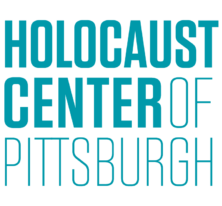
Photo by Brian Cohen
Profile by Emerson Driscoll
For Shaler High School teachers Catlyn DiPasquale and Kimberly Piekarski fighting antisemitism means working at the local or even individual level. They both understand their role in defeating hate won’t be accomplished through some extraordinary measure.
“There is no grand gesture you have to do to speak up about antisemitism,” Piekarski said. “Every little bit counts.”
The “little bit” that DiPasquale and Piekarski have been doing does count, and for their efforts in fighting antisemitism, they are Righteous Among the Neighbors recipients.
Specifically, DiPasquale works as a Holocaust educator as well as a coordinator for the LIGHT Education Initiative which was founded by Shaler colleague Nick Haberman in 2017. When Haberman left his teaching position at Shaler to focus on LIGHT, which stands for leadership through genocide and human rights training, DiPasquale started teaching the Holocaust Education class Haberman created over a decade ago.
Piekarski, an ESL teacher at Shaler, is also a LIGHT coordinator. Her work as an ESL teacher has really highlighted the types of discrimination kids face when coming to a new country.
Piekarski focuses her time helping students who move to Shaler from other countries and struggle speaking English to adjust not only to the new language, but the environment. Here, she sees the discrimination factor that could come into play as a person in a new country.
Every day, DiPasquale works with kids from different backgrounds and, ultimately, their connection with one another gives her hope. In one account, DiPasquale remembers a Jewish student who was new to the area who brought in challah bread to share with others.
In this way, the student was sharing her background with others in an experience that the students could connect with just by eating together. DiPasquale says it is a celebration of differences and highlights the connections that are formed when students are “exposed to antisemitic experiences.”
The more people “can break bread with each other,” the better off we will be, she said.
Other minority groups come together, and show up for one another, she said. “We need to come together, stand together, be together.”
Ultimately, after the shooting at the three Pittsburgh synagogues five years ago, developing these “connections between students” to avoid a similar event in the future becomes much more crucial. By treating the Holocaust and this much more recent hate act as a learning experience, these students can move from a place of hate and unfamiliarity to understanding.
Piekarski has a very similar outlook. As a person who works with immigrants and refugees on a regular basis, she takes on a very protective role. She says that her job really is an opportunity to advocate for those that don’t have a voice. In becoming this voice, she has found it extremely important to show that she cares and wants to make students feel safe in every aspect of their lives, especially when it comes to their differences.
“We must uplift these voices, uplift these individuals,” Piekarski said. “We have to.”
DiPasquale recognizes that it is difficult to truly understand others and their differences She instructs her students to “understand [their] own privilege” and “use it for good.”
DiPasquale believes that by saying “I see you” and “using your voice to help uplift others voices,” people can feel validated.
“It’s okay to not know; it’s okay to be uncomfortable,” she said, “We can learn and grow alongside other students, and learn just as much as them.”
After such a horrible event so close to the Shaler area, LIGHT focuses heavily on the safety factor with students. DiPasquale and Piekarski want their students to question what it would be like to live in a world where this hate went unchecked. What would life be like?
The LIGHT students grapple with this question, and understand that for people to come together, they have to feel safe. To be vulnerable and share experiences, they have to know they are accepted and not in harm’s way.
“Respect,” DiPasquale said, “is the biggest factor in my classroom.”
DiPasquale and Piekarski both hope their individual efforts can grow in the community.
“It’s contagious once it starts,” Piekarski said.
